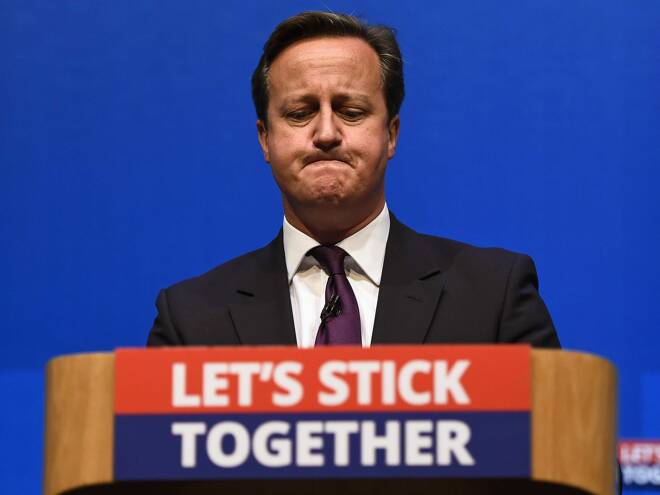Advertisement
Advertisement
What Is “Brexit” And Will Cameron’s Negotiations Bear Fruit
By:
It seems that the financial markets keep creative new terms, just recently we managed to get through Grexit and now we have moved to Brexit. Most people
It seems that the financial markets keep creative new terms, just recently we managed to get through Grexit and now we have moved to Brexit. Most people do not really understand the relationship between the UK and the Eurozone, especially since the UK continued to use the Pound Sterling as its currency and is not part of the ECB and did not take part in the bailout of countries like Ireland, Spain, Portugal and Greece.
Bloomberg best explains as follows:
“Countries band together to promote trade, defend human rights, protect the environment and repel threats. They sign treaties and join international groups, and each time they do, they agree to give up a bit of independence. That happened in a big way with the creation of the European Union, a common market and global political force forged from the fractious states of Europe.
The European Union is an economic and political partnership involving 28 European countries. It began after World War Two to foster economic co-operation, with the idea that countries which trade together are more likely to avoid going to war with each other. It has since grown to become a “single market” allowing goods and people to move around, basically as if the member states were one country. It has its own currency, the euro, which is used by 19 of the member countries, its own parliament and it now sets rules in a wide range of areas
The question always was; could this extraordinary experiment hold together? Concern about a split is rising as the United Kingdom plans to hold a vote on leaving the bloc it joined in 1973. The way many Brits see it, the trade-offs no longer serve their interests; they prefer the idea of living outside the EU, as Norway and Switzerland do. The U.K. is engulfed in a debate over what’s popularly called a “Brexit.”
Britain had a referendum in 1975 shortly after it had joined the EU, or the Common Market as it was then called. The country voted to stay in then but there have been growing calls, from the public and politicians, for another vote because, they argue, the EU has changed a lot over the past 40 years, with many more countries joining and the organization extending its control over more aspects of daily lives.
A referendum is basically a vote in which everyone (or nearly everyone) of voting age can take part, normally giving a “Yes” or “No” answer to a question. Whichever side gets more than half of all votes cast is considered to have won. The Conservatives’ election manifesto promised to hold a referendum on whether or not the UK should stay in or leave the European Union by the end of 2017.
Britain the EU have been in intense negotiations to head off a possible exit by the UK which could crush the Eurozone. Most polls suggest a majority of voters favor staying in the EU, though some surveys show diminishing support or that more want to quit.
British euroskeptics say the EU wants to grow into a super-state that impinges more on national sovereignty. They say the U.K. has global clout without the EU — it has a permanent seat on the UN Security Council — and would negotiate better trade treaties without being held back by EU protectionists. Champions of membership point out that the EU is the country’s largest export market, and that global companies locate in the U.K. because they can sell into other EU nations without tariffs. The country has benefited from free movement, with employers tapping a pool of cheap, skilled labor. The threat of a British exit has led EU countries to make some positive noises about concessions in order to keep the country in. Germany wants to keep the U.K. in as a free-market counterbalance to France, though Chancellor Angela Merkel has made clear that the right to freedom of movement in the EU is unassailable.
According to analysis by economists Jamie Murray and Dan Hanson at Bloomberg Intelligence, a “Brexit” would deliver three punches to the 1.8 trillion-pound ($2.6 trillion) economy through confidence, credit and currency shocks. The referendum on the U.K.’s membership of the European Union could take place as early as June.
The prime minister presented an agreement on Tuesday as a hard-won triumph, the result of “strong, determined and patient negotiation.” In fact, it represented a downgrade of what he had originally asked for. A promised ban on welfare payments for children living abroad became an indexing of the claims to local living costs. A ban on foreign workers claiming welfare for four years turned into temporary power to taper those claims.
For all that, the referendum will see the bulk of the Conservative, Labor, Scottish National Party and Liberal Democrat lawmakers line up alongside business groups to argue for Britain to stay in a bloc it joined in 1973.
“I think we will be able to show that on balance, Britain is better off, more secure, more prosperous, better chance of success when inside the European Union,” Cameron said yesterday in a speech We will be able to argue that Britain will have the best of both worlds.”
About the Author
Barry Normanauthor
Latest news and analysis
Advertisement
